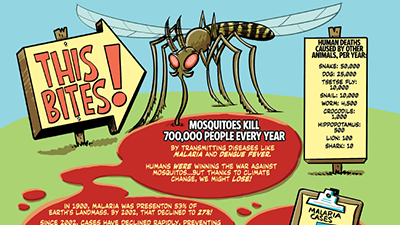Indirect Impacts of Climate Change
Teacher Resources
Driving Question: How is climate change affecting people?
Explore the ways that changes in Earth’s natural systems are impacting human systems. Investigate the connections between climate impacts and their effects on people and communities around the world.
Learning Objectives:
- Identify and describe indirect impacts of climate change.
- Analyze how climate impacts vary depending on factors such as geography, health, and income.
- Evaluate evidence to understand the effects of climate change on humans.
Vocab Terms:
- climate justice
- disease vectors
- indirect impacts
- infrastructure
- migration
Opener: Indirect Impacts of Climate Change
To teach this lesson step, refer to page 2 of Lesson 2.3 Teaching Guide.
How are the effects of climate connected? Explore the ripple effect of climate impacts.
Exploring Risks
For more resources to help students understand causation, try these materials in Lesson 2.3 of OER Project: Big History.
How do people and regions experience varying vulnerabilities to climate change? Where you live and what you do for a living can determine how you experience certain climate impacts.
Assessing Correlation and Causation
To teach this lesson step, refer to page 4 of Lesson 2.3 Teaching Guide.
Looking to differentiate, modify or adapt this assignment? Check out our Differentiation Guide.
Does eating ice cream cause violent crime? Being able to accurately assess the relationship between two factors will help you make good use of information and enable you to see when information is being used to support a faulty assertion.
Climate and Human Health
To teach this lesson step, refer to page 7 of Lesson 2.3 Teaching Guide.
Our online teacher community is a great resource for suggestions on how to implement climate project in your classroom.
Knowing how climate change impacts our heath is an important piece of understanding the consequences of direct and indirect impacts.
Exploring Climate Justice
Teaching migration and climate in a geography class? Check out this lesson in OER Project: Big History for more resources.
Climate change has no bias, but societies do. What’s the role of climate and environmental justice when it comes to taking on climate change? First, use the activity to think about your own definitions, and then learn more in the video.
-
Guiding Questions
-
Before you watch
Preview the questions below, and then review the transcript.
While you watch
Look for answers to these questions:
- Why does this video begin with the example of the Rohingya?
- What is climate justice?
- How does coal plant placement highlight the ways that environmental and climate justice are linked?
- What is redlining and how is it related to climate change?
- What are some other groups who generally see more harm from the impacts of climate change?
After you watch
Respond to this question: The video claims that a natural disaster only becomes a human-caused disaster when it impacts human communities and when societal inequity limits the ability to protect people from the disaster. Do you agree? Can you think of any examples when a natural disaster turned into a human-caused disaster?
Climate and Disease
To teach this lesson step, refer to page 10 of Lesson 2.3 Teaching Guide.
Check out this blog post – How to write without writing – for some strategies to get students excited about writing.
We had been winning the war against mosquitoes, but is the tide turning in their favor? Check out the facts in the infographic, and then use the activity to evaluate the evidence.
-
Guiding Questions
-
Before you read
Preview the questions below, and then skim the full infographic, paying attention to things like prominent colors, numbers, charts, and types of text. How do you know where to start and in which direction to read? How do you know which numbers are most important? What concept is the focus of the graphic?
While you read
Look for answers to these questions:
- Why are mosquitoes a threat to human health?
- Historically, what was happening to the number of cases and geographical range of malaria?
- What regions bear most of the burden of vector-borne diseases?
- Why are we losing ground in the fight against mosquitoes?
- How do scientists predict climate change will impact malaria cases in the future?
After you read
Respond to this question: Warming temperatures are leading to indirect climate impacts, such as the spread of diseases. What are other ways climate change might impact human health?
Closer: Indirect Impacts of Climate Change
To teach this lesson step, refer to page 12 of Lesson 2.3 Teaching Guide.
You’ve explored the direct and indirect impacts of climate change. What do you think are the most important issues to address? You’ll decide by exploring some of the solutions.
Unit 2 Assessment: The Impacts of Climate Change
To teach this lesson step, refer to page 12 of Lesson 2.3 Teaching Guide.
This writing assessment is an opportunity for you to showcase what you’ve learned in this unit by analyzing documents and creating an argument about the impacts of climate change.








